Reflective Analysis: Leadership and Conflict Resolution in Nursing
VerifiedAdded on 2022/12/27
|5
|974
|72
Journal and Reflective Writing
AI Summary
This assignment is a reflective journal entry focusing on the leadership experiences and observations within a nursing care home setting. The author reflects on the leadership style of a registered nurse leader, Matt Daley, particularly in handling team conflicts. Using Gibbs' reflective cycle, the author describes a situation involving team conflict, evaluates the leader's approach (participative leadership), and analyzes the need for a more structured leadership style, potentially incorporating autocratic elements for better discipline and direction. The reflection concludes with an action plan for personal development, emphasizing the importance of enhancing decision-making, problem-solving skills, and emotional regulation to become a more effective leader. The author acknowledges Desklib as a valuable resource for accessing similar assignments and study tools.
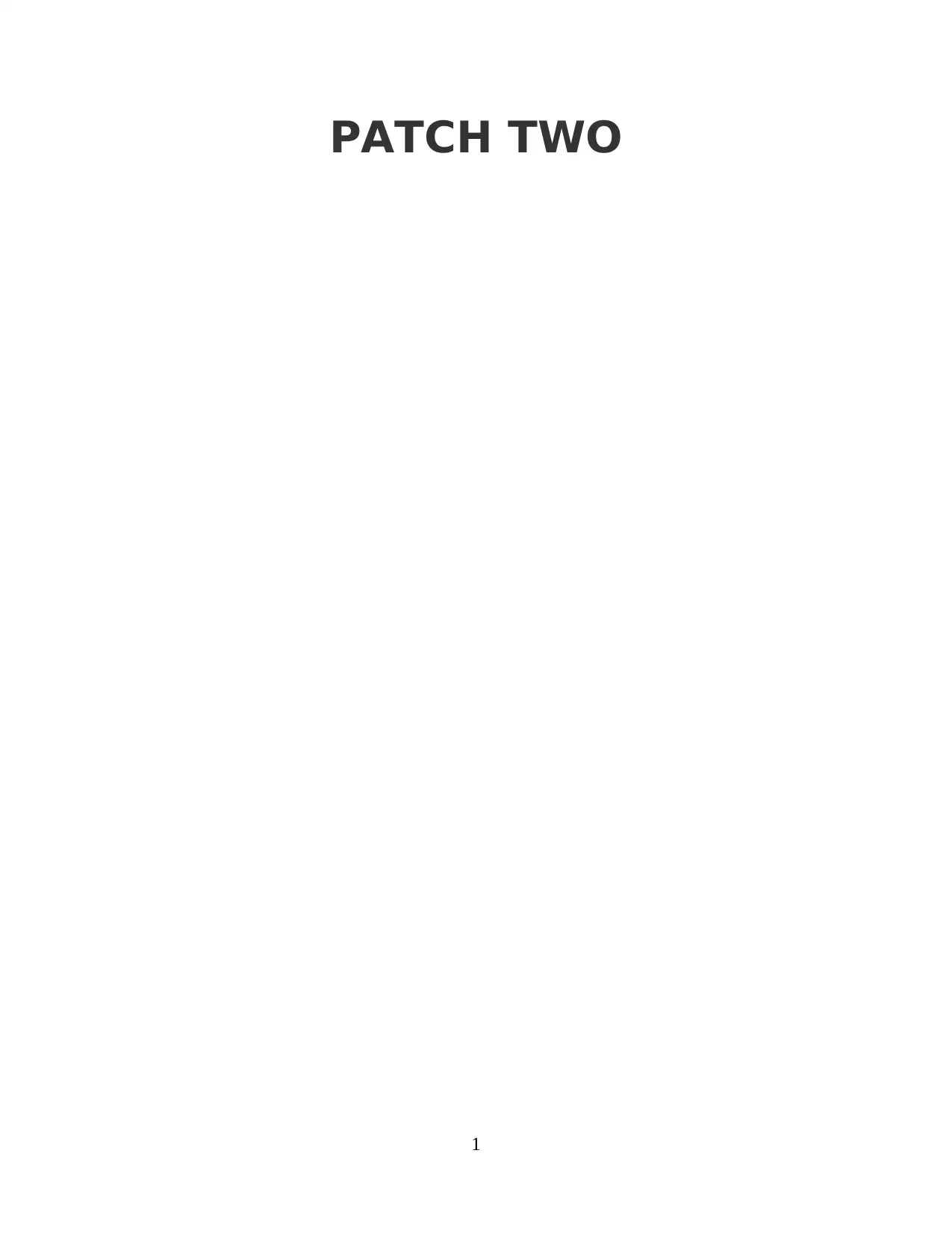
PATCH TWO
1
1
Paraphrase This Document
Need a fresh take? Get an instant paraphrase of this document with our AI Paraphraser
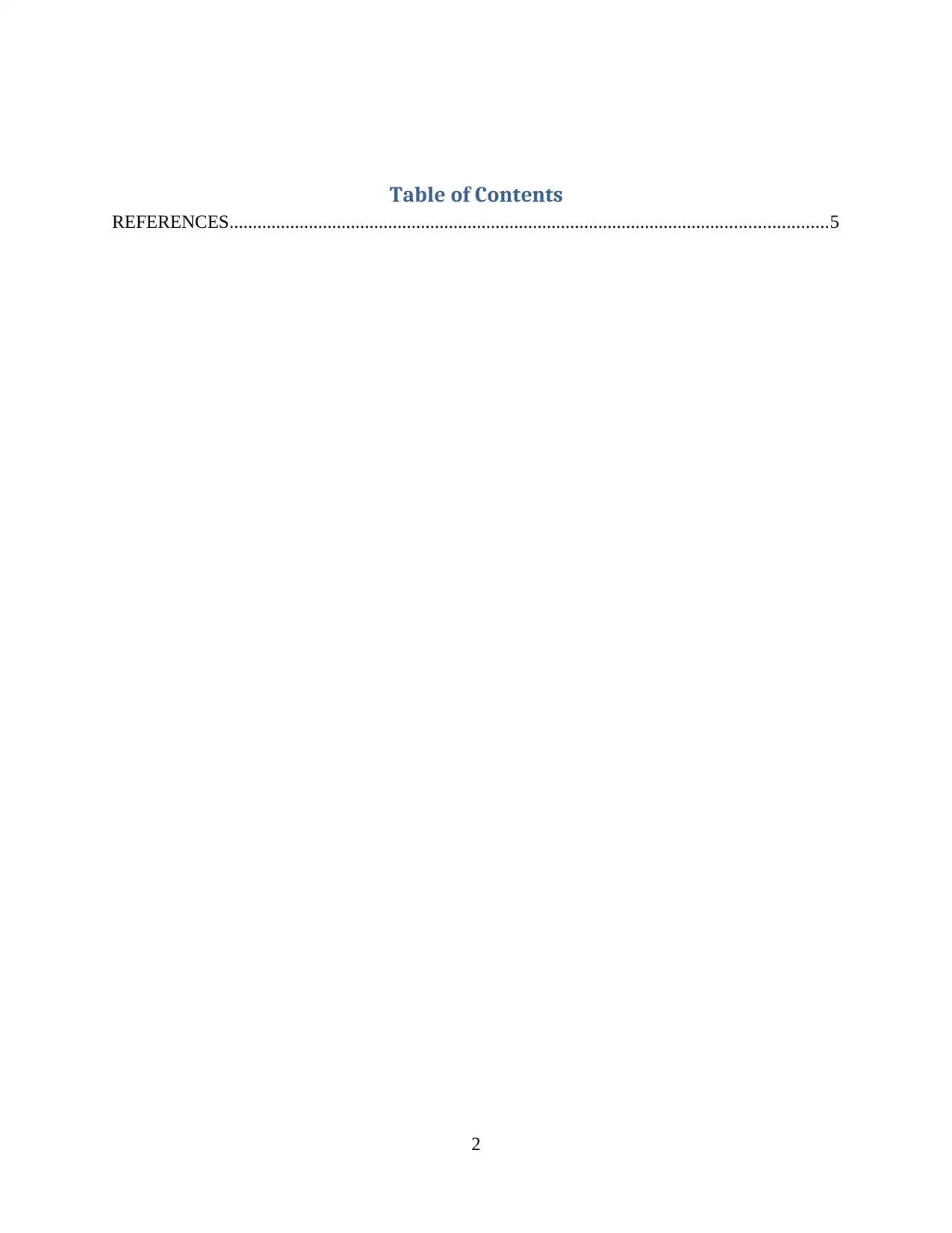
Table of Contents
REFERENCES................................................................................................................................5
2
REFERENCES................................................................................................................................5
2
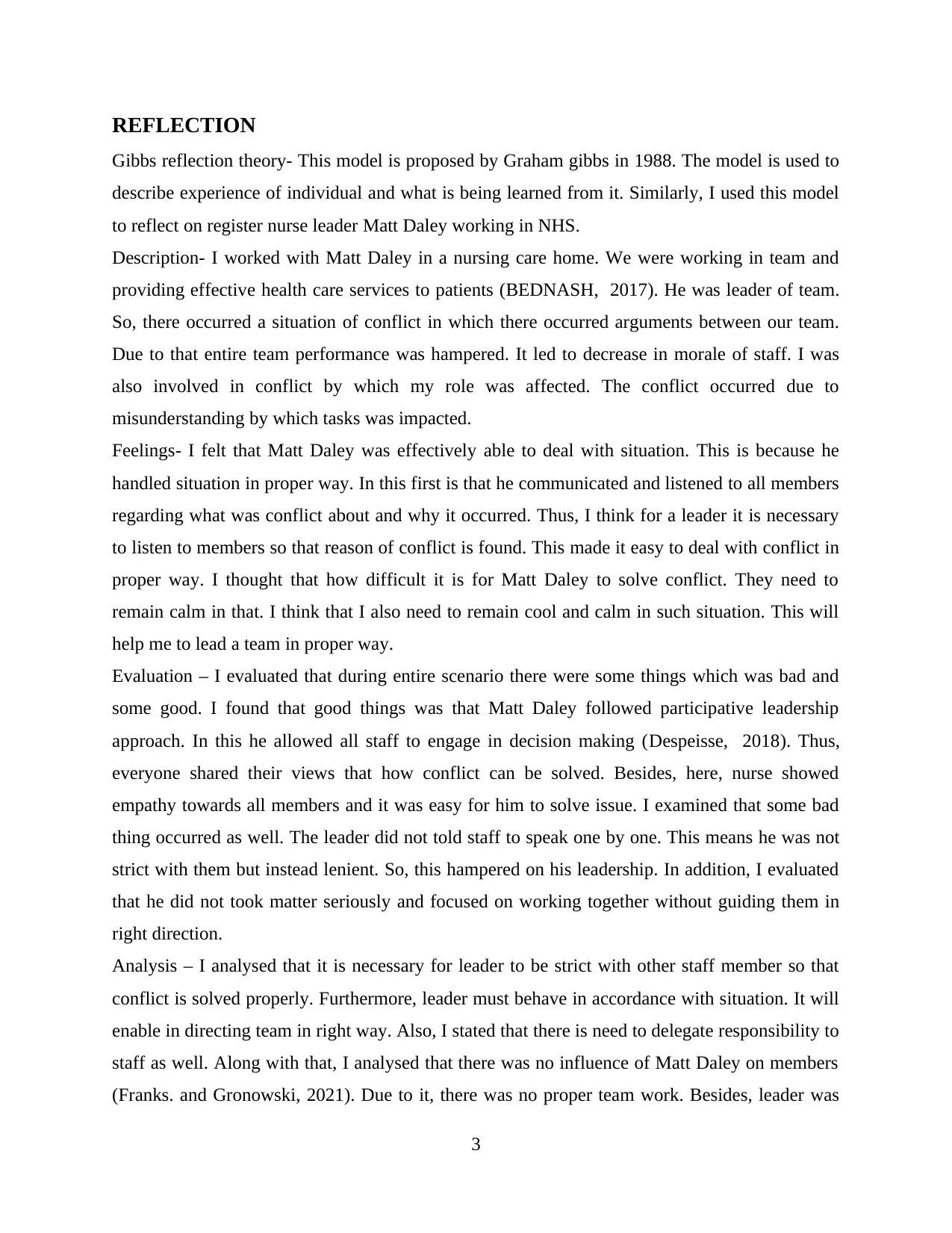
REFLECTION
Gibbs reflection theory- This model is proposed by Graham gibbs in 1988. The model is used to
describe experience of individual and what is being learned from it. Similarly, I used this model
to reflect on register nurse leader Matt Daley working in NHS.
Description- I worked with Matt Daley in a nursing care home. We were working in team and
providing effective health care services to patients (BEDNASH, 2017). He was leader of team.
So, there occurred a situation of conflict in which there occurred arguments between our team.
Due to that entire team performance was hampered. It led to decrease in morale of staff. I was
also involved in conflict by which my role was affected. The conflict occurred due to
misunderstanding by which tasks was impacted.
Feelings- I felt that Matt Daley was effectively able to deal with situation. This is because he
handled situation in proper way. In this first is that he communicated and listened to all members
regarding what was conflict about and why it occurred. Thus, I think for a leader it is necessary
to listen to members so that reason of conflict is found. This made it easy to deal with conflict in
proper way. I thought that how difficult it is for Matt Daley to solve conflict. They need to
remain calm in that. I think that I also need to remain cool and calm in such situation. This will
help me to lead a team in proper way.
Evaluation – I evaluated that during entire scenario there were some things which was bad and
some good. I found that good things was that Matt Daley followed participative leadership
approach. In this he allowed all staff to engage in decision making (Despeisse, 2018). Thus,
everyone shared their views that how conflict can be solved. Besides, here, nurse showed
empathy towards all members and it was easy for him to solve issue. I examined that some bad
thing occurred as well. The leader did not told staff to speak one by one. This means he was not
strict with them but instead lenient. So, this hampered on his leadership. In addition, I evaluated
that he did not took matter seriously and focused on working together without guiding them in
right direction.
Analysis – I analysed that it is necessary for leader to be strict with other staff member so that
conflict is solved properly. Furthermore, leader must behave in accordance with situation. It will
enable in directing team in right way. Also, I stated that there is need to delegate responsibility to
staff as well. Along with that, I analysed that there was no influence of Matt Daley on members
(Franks. and Gronowski, 2021). Due to it, there was no proper team work. Besides, leader was
3
Gibbs reflection theory- This model is proposed by Graham gibbs in 1988. The model is used to
describe experience of individual and what is being learned from it. Similarly, I used this model
to reflect on register nurse leader Matt Daley working in NHS.
Description- I worked with Matt Daley in a nursing care home. We were working in team and
providing effective health care services to patients (BEDNASH, 2017). He was leader of team.
So, there occurred a situation of conflict in which there occurred arguments between our team.
Due to that entire team performance was hampered. It led to decrease in morale of staff. I was
also involved in conflict by which my role was affected. The conflict occurred due to
misunderstanding by which tasks was impacted.
Feelings- I felt that Matt Daley was effectively able to deal with situation. This is because he
handled situation in proper way. In this first is that he communicated and listened to all members
regarding what was conflict about and why it occurred. Thus, I think for a leader it is necessary
to listen to members so that reason of conflict is found. This made it easy to deal with conflict in
proper way. I thought that how difficult it is for Matt Daley to solve conflict. They need to
remain calm in that. I think that I also need to remain cool and calm in such situation. This will
help me to lead a team in proper way.
Evaluation – I evaluated that during entire scenario there were some things which was bad and
some good. I found that good things was that Matt Daley followed participative leadership
approach. In this he allowed all staff to engage in decision making (Despeisse, 2018). Thus,
everyone shared their views that how conflict can be solved. Besides, here, nurse showed
empathy towards all members and it was easy for him to solve issue. I examined that some bad
thing occurred as well. The leader did not told staff to speak one by one. This means he was not
strict with them but instead lenient. So, this hampered on his leadership. In addition, I evaluated
that he did not took matter seriously and focused on working together without guiding them in
right direction.
Analysis – I analysed that it is necessary for leader to be strict with other staff member so that
conflict is solved properly. Furthermore, leader must behave in accordance with situation. It will
enable in directing team in right way. Also, I stated that there is need to delegate responsibility to
staff as well. Along with that, I analysed that there was no influence of Matt Daley on members
(Franks. and Gronowski, 2021). Due to it, there was no proper team work. Besides, leader was
3
⊘ This is a preview!⊘
Do you want full access?
Subscribe today to unlock all pages.

Trusted by 1+ million students worldwide
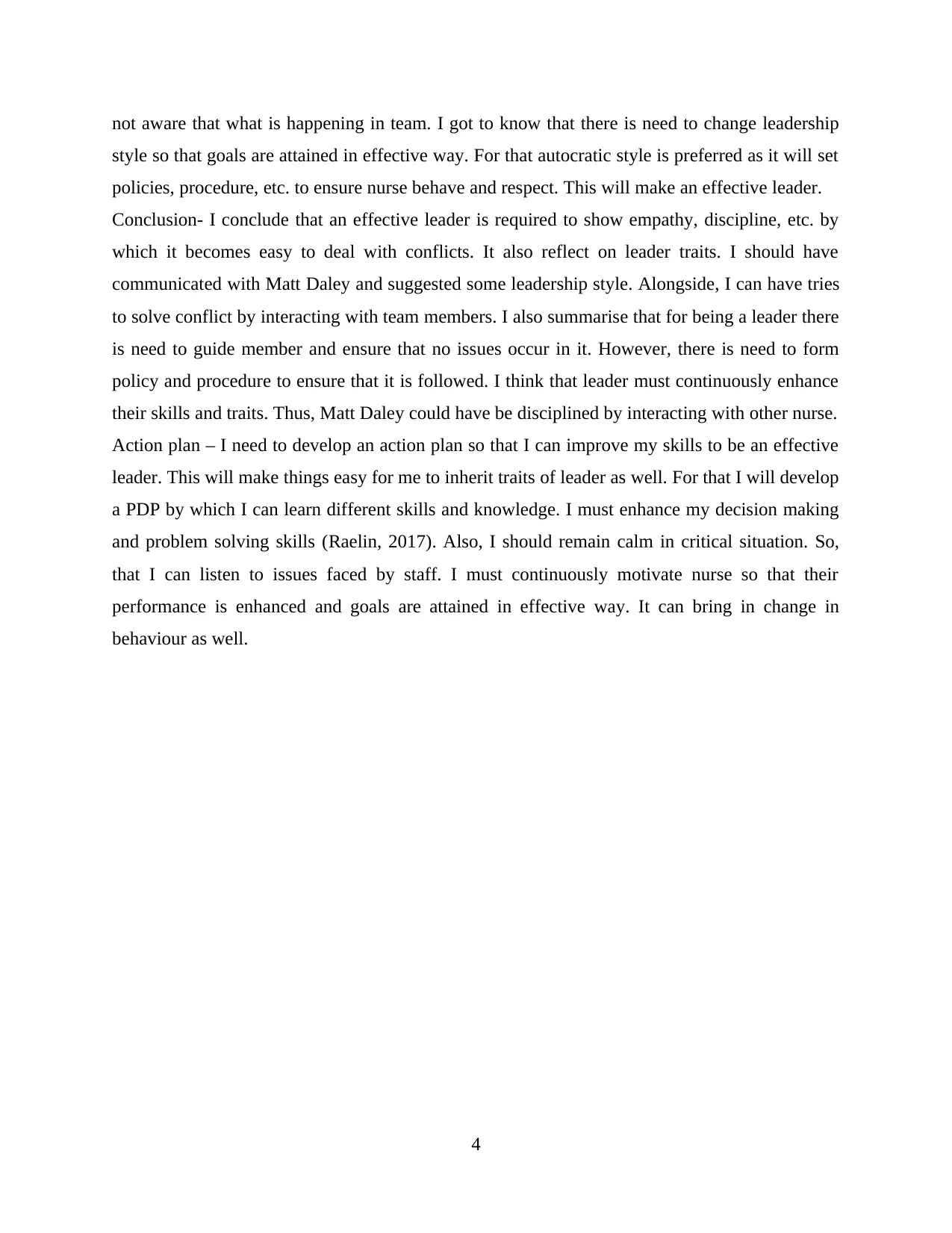
not aware that what is happening in team. I got to know that there is need to change leadership
style so that goals are attained in effective way. For that autocratic style is preferred as it will set
policies, procedure, etc. to ensure nurse behave and respect. This will make an effective leader.
Conclusion- I conclude that an effective leader is required to show empathy, discipline, etc. by
which it becomes easy to deal with conflicts. It also reflect on leader traits. I should have
communicated with Matt Daley and suggested some leadership style. Alongside, I can have tries
to solve conflict by interacting with team members. I also summarise that for being a leader there
is need to guide member and ensure that no issues occur in it. However, there is need to form
policy and procedure to ensure that it is followed. I think that leader must continuously enhance
their skills and traits. Thus, Matt Daley could have be disciplined by interacting with other nurse.
Action plan – I need to develop an action plan so that I can improve my skills to be an effective
leader. This will make things easy for me to inherit traits of leader as well. For that I will develop
a PDP by which I can learn different skills and knowledge. I must enhance my decision making
and problem solving skills (Raelin, 2017). Also, I should remain calm in critical situation. So,
that I can listen to issues faced by staff. I must continuously motivate nurse so that their
performance is enhanced and goals are attained in effective way. It can bring in change in
behaviour as well.
4
style so that goals are attained in effective way. For that autocratic style is preferred as it will set
policies, procedure, etc. to ensure nurse behave and respect. This will make an effective leader.
Conclusion- I conclude that an effective leader is required to show empathy, discipline, etc. by
which it becomes easy to deal with conflicts. It also reflect on leader traits. I should have
communicated with Matt Daley and suggested some leadership style. Alongside, I can have tries
to solve conflict by interacting with team members. I also summarise that for being a leader there
is need to guide member and ensure that no issues occur in it. However, there is need to form
policy and procedure to ensure that it is followed. I think that leader must continuously enhance
their skills and traits. Thus, Matt Daley could have be disciplined by interacting with other nurse.
Action plan – I need to develop an action plan so that I can improve my skills to be an effective
leader. This will make things easy for me to inherit traits of leader as well. For that I will develop
a PDP by which I can learn different skills and knowledge. I must enhance my decision making
and problem solving skills (Raelin, 2017). Also, I should remain calm in critical situation. So,
that I can listen to issues faced by staff. I must continuously motivate nurse so that their
performance is enhanced and goals are attained in effective way. It can bring in change in
behaviour as well.
4
Paraphrase This Document
Need a fresh take? Get an instant paraphrase of this document with our AI Paraphraser
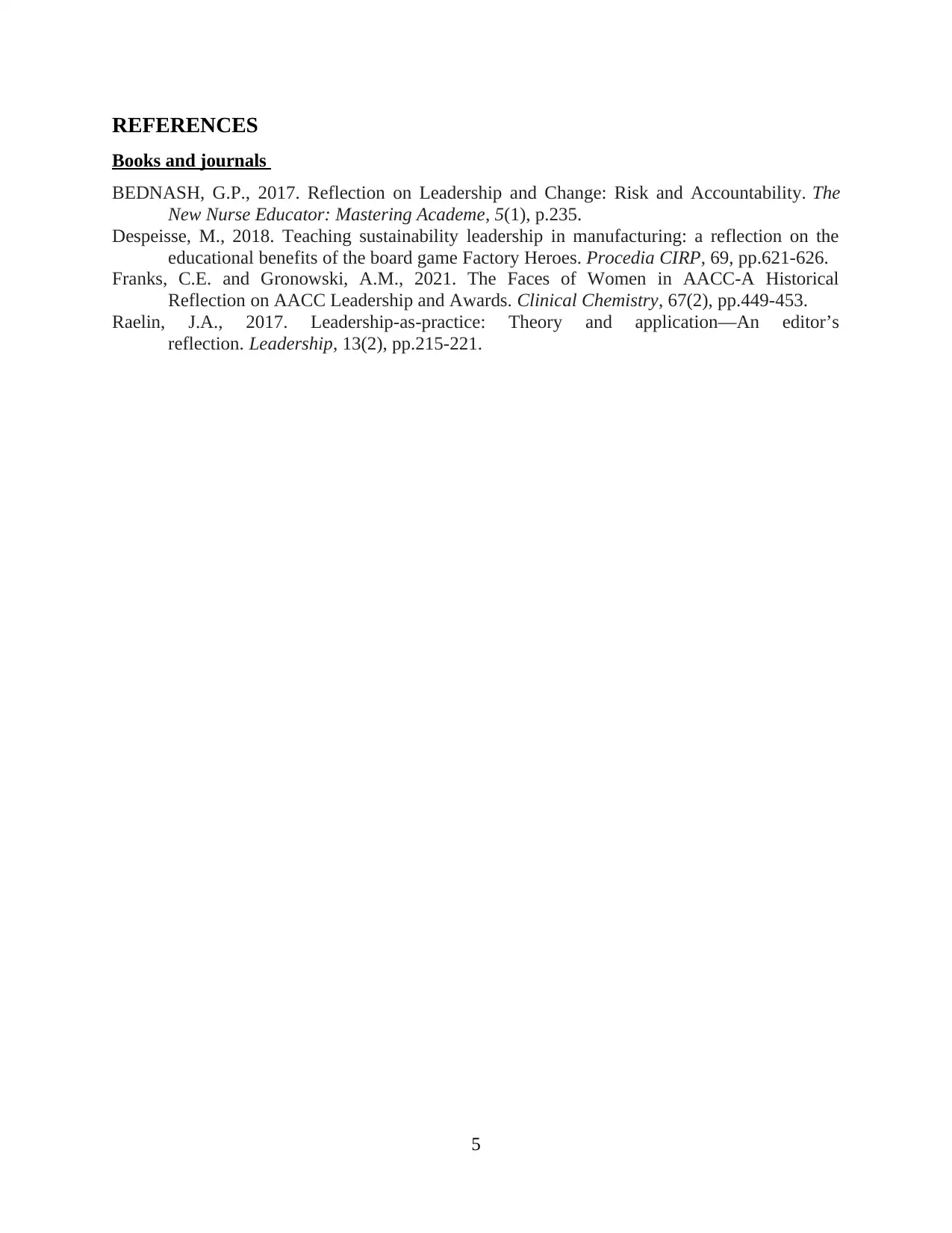
REFERENCES
Books and journals
BEDNASH, G.P., 2017. Reflection on Leadership and Change: Risk and Accountability. The
New Nurse Educator: Mastering Academe, 5(1), p.235.
Despeisse, M., 2018. Teaching sustainability leadership in manufacturing: a reflection on the
educational benefits of the board game Factory Heroes. Procedia CIRP, 69, pp.621-626.
Franks, C.E. and Gronowski, A.M., 2021. The Faces of Women in AACC-A Historical
Reflection on AACC Leadership and Awards. Clinical Chemistry, 67(2), pp.449-453.
Raelin, J.A., 2017. Leadership-as-practice: Theory and application—An editor’s
reflection. Leadership, 13(2), pp.215-221.
5
Books and journals
BEDNASH, G.P., 2017. Reflection on Leadership and Change: Risk and Accountability. The
New Nurse Educator: Mastering Academe, 5(1), p.235.
Despeisse, M., 2018. Teaching sustainability leadership in manufacturing: a reflection on the
educational benefits of the board game Factory Heroes. Procedia CIRP, 69, pp.621-626.
Franks, C.E. and Gronowski, A.M., 2021. The Faces of Women in AACC-A Historical
Reflection on AACC Leadership and Awards. Clinical Chemistry, 67(2), pp.449-453.
Raelin, J.A., 2017. Leadership-as-practice: Theory and application—An editor’s
reflection. Leadership, 13(2), pp.215-221.
5
1 out of 5
Related Documents
Your All-in-One AI-Powered Toolkit for Academic Success.
+13062052269
info@desklib.com
Available 24*7 on WhatsApp / Email
![[object Object]](/_next/static/media/star-bottom.7253800d.svg)
Unlock your academic potential
Copyright © 2020–2026 A2Z Services. All Rights Reserved. Developed and managed by ZUCOL.



